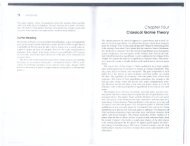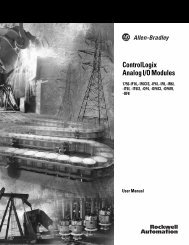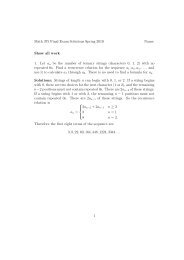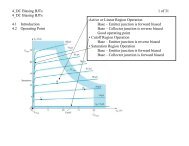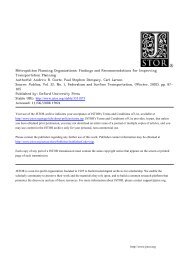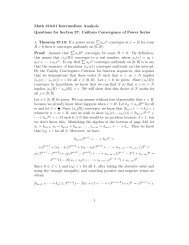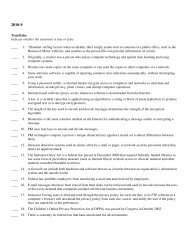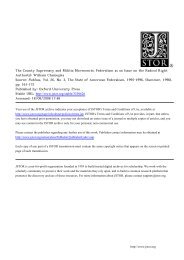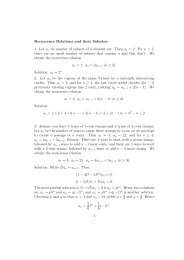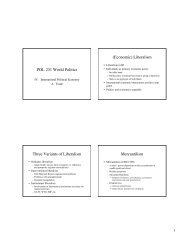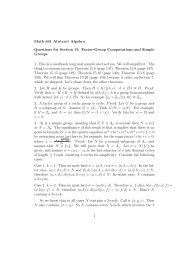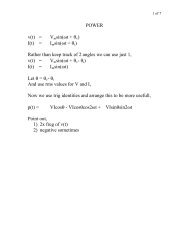Clemons and McBeth - MavDISK
Clemons and McBeth - MavDISK
Clemons and McBeth - MavDISK
Create successful ePaper yourself
Turn your PDF publications into a flip-book with our unique Google optimized e-Paper software.
40 PARTJ . THEORY AND PRAClJCE<br />
studies, suggested that there was one best way to organize <strong>and</strong> accomplish tasks. The scientific<br />
practice of administration seemed clearly at odds with the idea of politics.'<br />
In 1945 Herbert Simon introduced his classic work Administrative Behavior, which<br />
sought to overthrow what he termed the proverbs of classic public administration theory found<br />
in the work of Gulick, Goodnow, <strong>and</strong> Wilson. Simon wrote that ultimately public administra.<br />
tion is about decision making <strong>and</strong> that decision making involves some variant of three steps:<br />
scanning the environment, developing alternatives, <strong>and</strong> choosing alternatives.<br />
Despite his emphasis on science instead of proverbs, his ideas actually reinforced the<br />
politics/administration dichotomy. Denhardt (2008, p. 71) writes, "Actually, Simon's conclu.<br />
sions were far less a departure from the mainstream of work in the field than his harsh language<br />
implied." Simon replaced the politics/administration dichotomy with the fact/value dichotomy<br />
<strong>and</strong> focused the study of public administration away from ends <strong>and</strong> on means. Denhardt con.<br />
cludes that Simon's major contribution was his emphasis on logical positivism, which separates<br />
facts <strong>and</strong> values, <strong>and</strong> his implicit endorsement of "generic" administration, which, according to<br />
Denhardt, led to a situation in which "more <strong>and</strong> more concern would be focused on means rather<br />
than ends, on administrative techniques rather than political principles." In short, Simon argued<br />
that decision making as well as decision administration can follow the scientific method.<br />
The rational model of decision making led to a host of rational models that all aimed<br />
at eliminating sloppy, uninformed, <strong>and</strong> "off the top of your head" decision making. Simon<br />
believed that we could <strong>and</strong> should separate "facts" from "values." Furthermore, he believed<br />
that decisions could be made scientifically using, among other things, computer modeling <strong>and</strong><br />
mathematical models.'<br />
The social sciences have long envied the more prestigious hard sciences-data based,<br />
cloaked in the power of numbers, <strong>and</strong> supposedly objective <strong>and</strong> free from the pollution of politics<br />
<strong>and</strong> culture. It is clear that the rational model was an attempt to move human decision making<br />
away from the emotional <strong>and</strong> sometimes corrupt world of politics to what was perceived<br />
as the calculated, dispassionate, impartial, <strong>and</strong> honest world of science. In general, this school<br />
of thought is called logical positivism, or, simply, positivism.<br />
Logical positivism is a scientific system that recognizes only nonmetaphysical <strong>and</strong> observable<br />
phenomena. The impact of this philosophy in many areas, including public policy analysis,<br />
has been extensive. It suggests training analysl~ to be value neutral, to objectively observe facts,<br />
<strong>and</strong> to let these empirical realities tell their own stories. Positivism has dominated policy analysis.<br />
Within this still-dominant worldview, the job of the analyst is to specify procedures to<br />
gather facts about the world as it is, to present those facts without error or prejudice, to<br />
formulate rational policy alternatives, <strong>and</strong> then to allow the politicians to make purposeful policy<br />
that will help solve the policy problem. An ice-cold, impartial review <strong>and</strong> evaluation of the<br />
policy should follow. All of this fits nicely with Gulick's call for informed <strong>and</strong> sound policy decisions<br />
by an expert bureaucracy. Box 2-1 suggests the positivist paradigm is still going strong.<br />
'Scientific management, or Taylorism as it is sometimes called, is a theory of management closely akin to the<br />
idea of the a.onf



